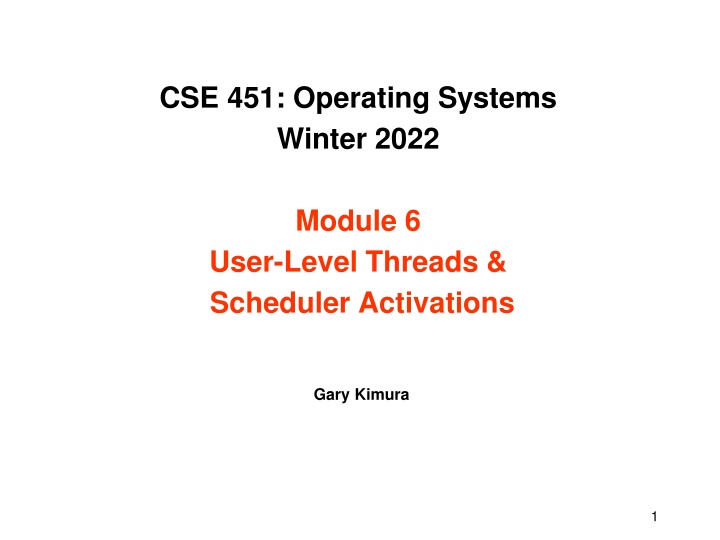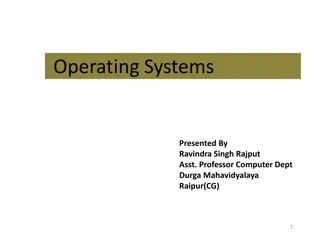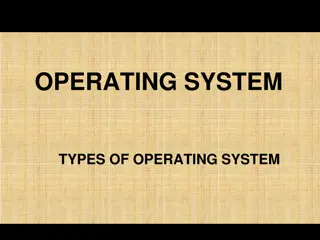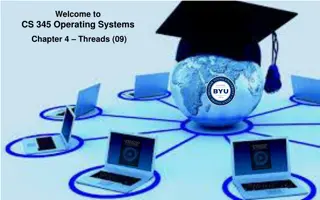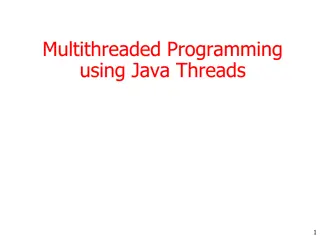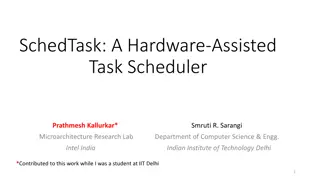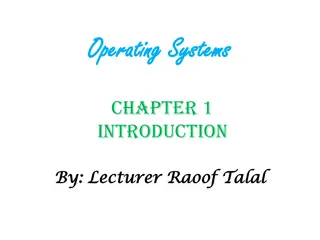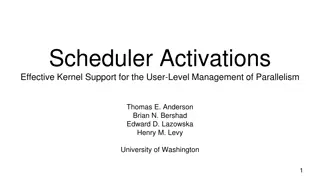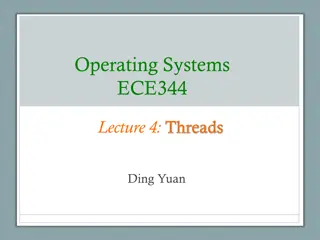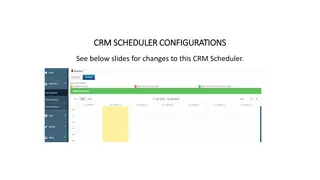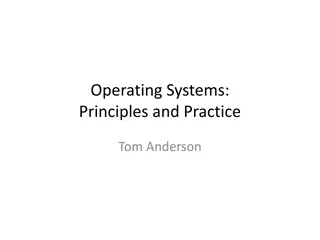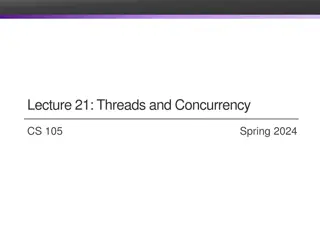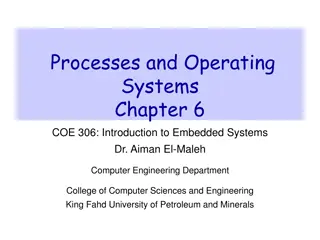Operating Systems Winter 2022 Module 6: User-Level Threads & Scheduler Activations
This module delves into the implementation of threads in operating systems, discussing the design space, kernel threads, user-level threads, and scheduler activations. It covers the concepts of concurrency, lightweight threads, and the management of threads and processes by the OS.
Download Presentation

Please find below an Image/Link to download the presentation.
The content on the website is provided AS IS for your information and personal use only. It may not be sold, licensed, or shared on other websites without obtaining consent from the author.If you encounter any issues during the download, it is possible that the publisher has removed the file from their server.
You are allowed to download the files provided on this website for personal or commercial use, subject to the condition that they are used lawfully. All files are the property of their respective owners.
The content on the website is provided AS IS for your information and personal use only. It may not be sold, licensed, or shared on other websites without obtaining consent from the author.
E N D
Presentation Transcript
CSE 451: Operating Systems Winter 2022 Module 6 User-Level Threads & Scheduler Activations Gary Kimura 1
Threads Support concurrency/parallelism within an application e.g. a web server that Key idea: separate the concept of a process (address space, OS resources) from that of a minimal thread of control (execution state: stack, stack pointer, program counter, registers) Threads are more lightweight, so much faster to create and switch between than processes thread 2
The design space Key older UNIXes MS/DOS one thread per process one process one thread per process many processes address space thread Java Mach, NT, Linux, many threads per process one process many threads per process many processes 3
Implementing Threads Two approaches to implementing threads: Kernel threads User-level threads Today: quick review of kernel threads more about user-level threads scheduler activations: adding kernel support for better user-level threads 4
Kernel threads OS now manages threads and processes / address spaces all thread operations are implemented in the kernel OS schedules all of the threads in a system, just like processes Kernel threads are cheaper than processes less state to manage: just the processor context (PC, SP, registers) Switching between kernel threads trap into kernel kernel saves running thread s processor context in TCB kernel picks new thread to run kernel loads new thread s registers, jumps to its saved PC Call this 1:1 scheduling 1 app thread per 1 kernel scheduled entity 5
Kernel threads Mach, NT, Linux, address space All thread operations (creating, destroying, waiting) go through the kernel os kernel thread CPU (thread create, destroy, signal, wait, etc.) 6
User-level threads Can implement threading entirely in user space run many user-level threads in one kernel thread call this N:1threading Keep separate stack & processor context for each thread, in user space User-level thread lib schedules and switches threads Switching between threads entails: library saves running thread s processor context library picks a new thread to run library restores new thread s context, jumps to saved PC Pretty much same as before, but kernel not involved! 7
User-level threads user-level thread library (thread create, destroy, signal, wait, etc.) address space All thread operations (creating, destroying, waiting) are handled by the thread library (not the kernel) os kernel thread CPU 8 8
User-level threads: what the kernel sees address space Kernel is oblivious to user-level threads! os kernel thread CPU 9 9 9
User-level vs kernel threads User level threads are faster Faster to switch between threads Round-trip to kernel: about 500 ns Switching in user space: closer to 5 ns (like a function call) Faster to create and destroy threads Some problems with user-level threads Can we take advantage of more than one processor? What if one of the threads does I/O, and blocks? Basic problem: lack of information in each scheduler Kernel doesn t know about user-level threads User-level scheduler doesn t know about other processes 10
User-level scheduling, multiprocessor style If all user-level threads run in one kernel thread, only one can run at a time! Most machines have more than 1 CPU core now Solution: use more than one kernel thread! 1 kernel thread per processor (N:M threading) User-level scheduler in each kernel thread chooses which user-level thread to run Kernel schedules the kernel-level threads, but is still oblivious to what's going on at user level 11
Multiple kernel threads powering each address space user-level thread library (thread create, destroy, signal, wait, etc.) address space kernel threads os kernel thread CPU (kernel thread create, destroy, signal, wait, etc.) 12 12
What if a thread tries to do I/O? The kernel thread powering it is lost for the duration of the I/O operation! address space Even if other user-level threads are ready, can t run them! user-level thread library BLOCKED kernel thread Kernel doesn t know there s anything else ready to run os kernel CPU Same problem with other blocking ops (e.g. page faults) user-level thread 13 13 13
Scheduler Activations Support for user-level threads without these problems Basic idea: let the kernel scheduler and the user-level scheduler coordinate with each other involves communication from user-level to OS and back From UW: [Anderson, Bershad, 92] Lots of impact on practical systems (more info later) 14
Scheduler Activations: 2-way communication OS and user-level schedulers give each other hints User-level scheduler tells the kernel what it needs request more CPUs (might not get them!) or release them Kernel calls user-level scheduler to notify it of events more/fewer CPUs available to process thread blocked on I/O, or unblocked when I/O finished Kernel to user-space communication: upcall A bit unusual: usually user-space makes syscalls to kernel! But this is also how signals work, and like an interrupt 15
Scheduler Activations Scheduler activations replace kernel threads A scheduler activation is like a kernel thread has a separate stack and processor context can be scheduled on a CPU but different: If the kernel interrupts an activation, it doesn t restart it where it left off (like a thread) Instead, it restarts execution in the user-level scheduler User-level scheduler can then decide which thread it wants to run on that CPU 16
Starting a new process New thread starts executing in thread lib User-level sched picks thread to run, starts it address space Can reschedule a different user-level thread later user-level thread library sched acts (kern threads) os kernel CPU thread 17 17 17
Blocking I/O Thread blocked on I/O Kernel creates new activation starts in the thread lib, and picks a new thread to run address space user-level thread library When I/O finishes, old thread doesn t resume BLOCKED sched acts (kern threads) Kernel interrupts an activation, lets the scheduler pick what to run os kernel CPU thread 18 18 18
Performance Is all that really faster than kernel-level threads? Not really lots of upcalls, not especially cheap But what we just saw were the uncommon cases! When threads aren t blocking on I/O, it s just user-level thread management! orders of magnitude faster than kernel-level threads and now we have an answer for the blocking I/O problem 19
The state of threading today Scheduler activations pretty widely used: Various Unixes: FreeBSD, NetBSD, Solaris, Digital UNIX (some now defunct) Windows 7 User-Mode Scheduling Recent research on multicore Oses Trend back to kernel-scheduled threads Linux, FreeBSD performance getting better, and less complex User-level threading still popular in massively-parallel applications 20
You really want multiple threads per address space Kernel threads are much more efficient than processes, but they re still not cheap all operations require a kernel call and parameter validation User-level threads are: really fast/cheap great for common-case operations creation, synchronization, destruction can suffer in uncommon cases due to kernel obliviousness I/O and other blocking operations Scheduler activations are an answer 21
What if a thread tries to do I/O? Remember: I/O operations are blocking The kernel thread powering it is lost for the duration of the I/O operation! The kernel thread blocks in the OS, as always Can t run a different user-level thread Same problem w/ other blocking ops (e.g. page faults) Again: kernel doesn t know there are user threads, so doesn t know there s something else it could run 22
